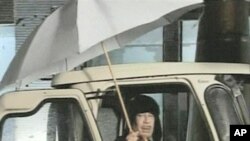The Libyan military continues to crack down on anti-government protesters, prompting an international outcry. Some Libyan officials are also calling for the violence to stop.
Witnesses in the capital, Tripoli, and other cities report more attacks by forces loyal to Libyan leader Moammar Gadhafi. Some say the violence is being carried out by people they describe as mercenaries, apparently from sub-Saharan Africa. The day before, witnesses said helicopter gunships fired on the demonstrators.
Late Monday, Gadhafi, who had not been seen in public for several days, was shown on state media as purportedly at Tripoli's Green Square, where protesters had been cleared out by force. He said he wanted to greet and spend the night with his supporters there.
As he looked out of his car, he noted it was raining. Before he said goodbye, he said he wanted to assure people he was in Tripoli, not on his way to Venezuela as some news organizations had indicated.
Gadhafi denying reports that he has fled to Venezuela:
Much of the non-government information coming out of Libya is provided by amateur video and other witness reports. The government has tried to stem the flow by shutting down the Internet and interrupting phone service.
Despite the curbs on communicating with each other and the outside freely, it appears that anti-government forces are in control of several places, including Benghazi, Libya's second largest city.
Gadhafi has also lost the support of several Libyan diplomats and other government officials around the world, who are splitting with the leader because of the crackdown. The nation's deputy ambassador to the United Nations, Ibrahim Dabbashi, spoke out late Monday.
"We ask the international community to take the necessary steps to help the Libyan people and to protect the Libyan people from the genocide it is facing now," he said.
Internal defections by officials are also reported, a serious step in a country where virtually no dissent has been tolerated by Gadhafi.
Protesters want an end to his more than 41-year rule, during which the leader managed to provide a measure of economic stability through the nation's oil wealth, but imposed a strict cult of personality. Fear of the government appeared to vanish last week, as demonstrations broke out across the country.
Of the various anti-government protests sweeping the Arab world, Libya's appears to be the bloodiest. Human rights groups and the United Nations are decrying the violence and asking for investigations into possible crimes against humanity.




